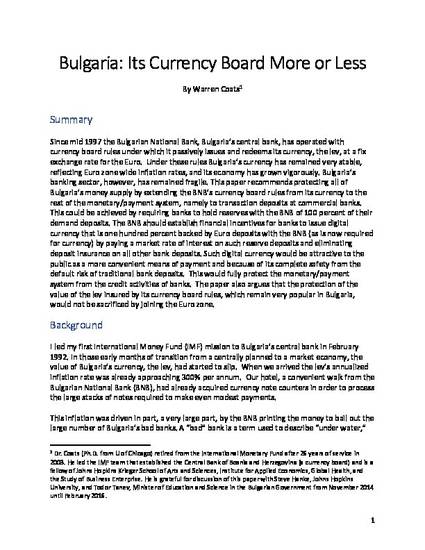
Article
Bulgaria and The Chicago Plan
Central Banking
(2020)
Abstract
Since mid 1997 the Bulgarian National Bank, Bulgaria’s central bank, has operated with currency board rules under which it passively issues and redeems its currency, the lev, at a fix exchange rate for the Euro. Under these rules Bulgaria’s currency has remained very stable, reflecting Euro zone wide inflation rates, and its economy has grown vigorously. Bulgaria’s banking sector, however, has remained fragile. This paper recommends protecting all of Bulgaria’s money supply by extending the BNB’s currency board rules from its currency to the rest of the monetary/payment system, namely to transaction deposits at commercial banks. This could be achieved by requiring banks to hold reserves with the BNB of 100 percent of their demand deposits. The BNB should establish financial incentives for banks to issue digital currency that is one hundred percent backed by Euro deposits with the BNB (as is now required for currency) by paying a market rate of interest on such reserve deposits and eliminating deposit insurance on all other bank deposits. Such digital currency would be attractive to the public as a more convenient means of payment and because of its complete safety from the default risk of traditional bank deposits. This would fully protect the monetary/payment system from the credit activities of banks. The paper also argues that the protection of the value of the lev insured by its currency board rules, which remain very popular in Bulgaria, would not be sacrificed by joining the Euro zone.
Keywords
- Euro,
- Currency board rules,
- The Chicago Plan,
- CBDC
Disciplines
Publication Date
March, 2020
Citation Information
Warren Coats. "Bulgaria and The Chicago Plan" Central Banking Vol. XXX Iss. 3 (2020) Available at: http://works.bepress.com/warren_coats/51/
